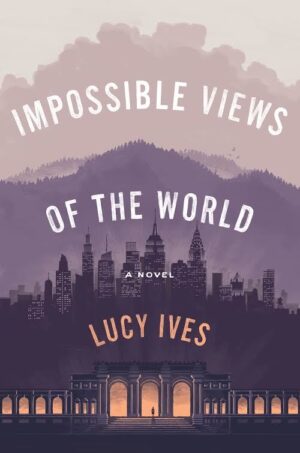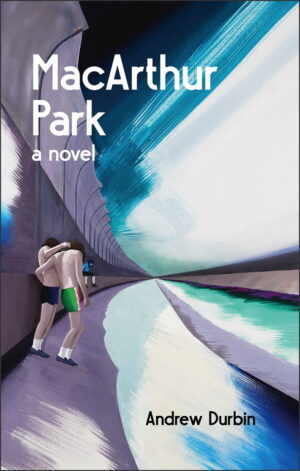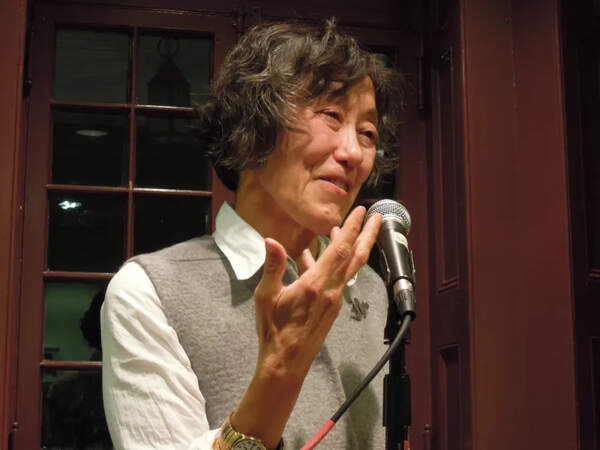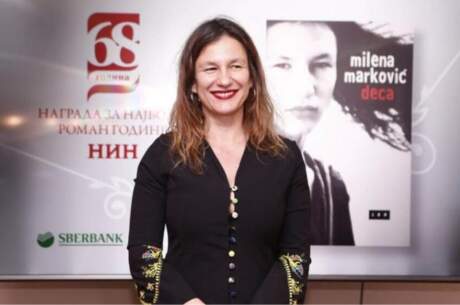Interviews
Poet Novelist: An Interview between Andrew Durbin and Lucy Ives
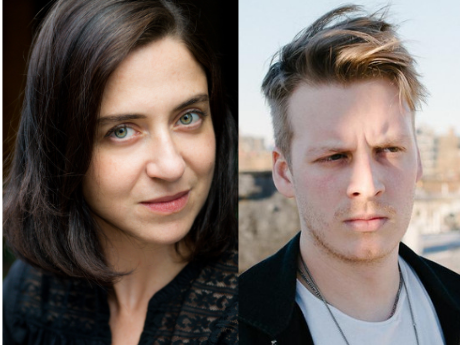
Andrew Durbin is the author of Mature Themes (Nightboat 2014). His work has also appeared in BOMB, Boston Review, Frieze, Texte zur Kunst, Triple Canopy, and elsewhere. He co-edits Wonder and lives in New York.
Lucy Ives's books include Anamnesis (Slope Editions, 2009), nineties (Tea Party Republicans Press, 2013; Little A, 2015), Orange Roses (Ahsahta Press, 2013), and The Hermit (Song Cave, 2016). Her writing has appeared in Art in America, Artforum, Lapham's Quarterly, and Vogue, among other publications. A former editor of Triple Canopy, she is currently editing a collection of writings by the artist Madeline Gins.
Both Durbin and Ives have published novels this year MacArthur Park (Nightboat, 2017) and Impossible Views of the World (Penguin, 2017), a New York Times Editors' Choice.
***
Poetry Society of America: The obvious question, but one that holds a certain fascination for poets: how did you think the process of writing a novel differed from the process of writing poetry?
Andrew Durbin: For me, writing a novel more closely resembled writing an essay and, in many ways, I think of MacArthur Park as a series of essayistic set pieces that I strung together using a loose and semi-autobiographical narrative. This wasn't totally unlike how I've written poetry in the past. My poems usually appear in prose, and they often self-consciously adopt various voices, forms, and styles of "non-poetic" writing, like the essay or the short story, so the distinction between these genres has been fuzzy for me from the start. I'm not sure I've ever thought of the differences between a fiction or a poem or an essay to be particularly meaningful to me, and I see my novel as a fiction stumbling into poetry and vice versa.
Lucy Ives: My novel, Impossible Views of the World, has the appearance of a traditional novel, in that elements such as "plot" and "character" are readily identifiable. I guess I'd say, perhaps too cannily since in retrospect, that many poems I've written have included these elements as well, though few people were likely to be looking for them in poetry. But I'm not really a poet; I'm a nonconformist writer who is interested in form and genre. Or maybe that's to say, I'm a poet, by which I merely mean, I'm a nonconformist writer who is interested in form and genre.
Andrew Durbin: Do you think of Impossible Views as a poet's novel? I don't quite see your new book as part of that odd genre (I cringe at the term since I've never been quite sure what it means, really), but I'm interested in the history of poets writing novels and those novels being called this specific-ish thing, the poet's novel. Did any of that come into play as you wrote?
Lucy Ives: Thank you for asking me this question. I feel a little embarrassed because I definitely have not succeeded in writing a poet's novel with Impossible Views. I've done other weird things that interest me, like making it very difficult to determine the novel's genre, but I haven't written something autobiographical or even really experimental—at least, not in the sense in which I believe that term is usually employed with respect to poet's novels, so called. I am very interested in mimicry and satire, in the ways in which the tropes of the realist novel can be warped and reworked to serve new ends. I'm always thinking about travesty, in a literary sense, and I guess you could say that Impossible Views is me writing my way into the field of the novel. It's an extremely silly book but I'm quite serious about what it does at the level of form. I should note that, in deference to the tradition of the poet's novel, I did include one character in Impossible Views who is a poet and who is writing a poet's novel—so that anyone looking for a poet's novel in my book would not be disappointed.
At risk of annoying you, I wanted to ask, would you ever write a poet's novel? Have you? What kind of novel are you writing with MacArthur Park if it is, as you note above, like "writing an essay"? Are there any important precedents for you, whether novels or other, here?
Andrew Durbin: You're incapable of annoying me! I'm not sure I have. If one tradition of the poet's novel is a text that dispenses with most of the straightforward aspects of fiction (like a plot or recognizably distinct characters), as in the novels of Leslie Scalapino and Renee Gladman, for example, then no, I haven't done that and probably won't. But following the New Narrative poets, many of whom wrote great novels (usually about narrative), then I could see MacArthur Park fitting in that lineage, since my book is, on some level, about writing a book. In the end, the novel is something of a happy accident. I initially wrote many of the parts—the chapter on Tom of Finland, the final section in London and Vienna—as separate from one another (I had originally imagined a more disjunctive book). But then, as I sat with them over the years, I found that these pieces belonged more tightly together than I had first realized, since they were each linked by a speaker (me, not-me) with like-minded concerns about art and community in the age of climate disaster. The book came in through the back door rather than the front.
A few observers have focused on your book's ample and brilliant use of secondary material, much of it invented, but, for me, I found Stella's voice to be one of the novel's oddest, most arresting features, partially because it's one that blends (like the book itself) so many tones and vocabularies. I loved Stella's moments of circumlocution, her office-administrative humor, her flashes of "intractable personality issues." It's an unexpected tone for a literary caper, and it's very different from your other work. She is hyper-intelligent, confused, driven, curious and—at times—a little melancholy. Can you talk about the prose of Impossible Views and how you developed Stella's unique voice?
Lucy Ives: I think your point about the novels of New Narrative being "about narrative" is a good one. I want to linger with that idea for a second before I start talking about Stella, because I think it's a good expression of the way in which a novel can also function as a work of criticism without becoming something other than a novel—or, while becoming something other than a novel, while also being a novel (I'm into these contradictions). Works of art are usually making arguments about various things, and I like to think of them as doing that at a level that is somehow previous to interpretation. In other words, we aren't required to look at them in agonized ways to understand them as having positions, political or otherwise; an argument might be built into the very choice to write in a certain way. This may also have something to do with ways you and I might both be influenced by non-literary forms of practice. I get the sense that you are interested in a broader field of art and performance; meanwhile, I like nerds. If I choose to write something that counts as "literature," part of that choice—for me, at least—is refusing other professional affiliations in favor of this sort of non affiliation. I didn't write this novel, or anything else I've written, because I can't write in any other way. Rather, I wrote in this way and wrote these things because I don't like writing that's too useful. Once an academic told me, "Your writing is so incredibly clear, which is amazing, because you never say anything!" This person was my teacher, and his preferred pedagogical tool was the insult (sadly common among boomers in the humanities). I took comfort in the knowledge that he had no idea how right he was.
But about Stella: There is a sense in which, as well as being human like, she is a stylistic tool, a way for me to synthesize various kinds of speech and writing and put them all in one place so that we can look at them together. It was important to me that she be able to curse and obsess over orthographic conventions. That she be able to talk about sex and clothing and class and the print revival, and so on.
OK, so here's a different sort of question: Can you tell me a little about the title of MacArthur Park? I find the rhyme in it fascinating—in this way that makes me feel weird about it also being the name of a real place. Can the title tell us something about how you think about places and names in the novel (and perhaps elsewhere)?
Andrew Durbin: My work is often concerned with the representation of place rather than the place itself, and the thicket of questions—political, aesthetic, social—that that divide reveals when we begin to venture into it. I like to get entangled in those questions because they inevitably raise a number of backend issues about my status as a viewer or listener or author. In the novel, the narrator drives past Echo Park, mistaking it for MacArthur Park, and tells his fellow travelers that Donna Summer recorded a song about the park that he loves. (Him being wrong matters in a way I won't discuss here.) Later, in that same chapter, the song acts as a Proustian madeleine of sorts. When he listens to it again, he is jolted into an extended memory of a night ride he took with a friend many years before in which they listened to Donna Summer and Frankie Knuckles. He is overcome by the memory of where he comes from (the South) and the awkwardness of his body (his friend attempts to take a photograph of him as Knuckles' "Your Love" plays, but he turns away in embarrassment). This is a long way of saying that I don't come to that kind of emotional material—another kind of thicket—so easily unless I begin somewhere else, whether it's a fiction or not. So, it is weird, that the title refers to a real place. But I think that's part of the strangeness of representation: that it is purports to stake a claim, in some way or another, about something or somewhere that belongs to people besides its author and is therefore subject to disagreement, to a mix of feelings, to a difference of opinion and experience.
It seems appropriate to bring up your title! It's lifted from a book within the book, of which there are many, and it concisely captures the "impossible view" your novel's protagonist attempts to take in her gumshoe research into her colleague's mysterious disappearance. Impossible Views is filled with such moments where viewing becomes a liberating, terrifying, and sometimes seemingly impossible moment of decision for Stella. Can you talk about some of the way your novel approaches seeing and being seen?
Lucy Ives: What a juicy question. My instinct is to say that my novel has a rather depressed or sunken relationship to the notion of seeing and being seen, in that the narrator feels she is constantly misapprehended by those she knows. But, on the other hand, this narrator, Stella, is an ecstatic seer and obsessive describer of the life and objects that surround her; the novel is packed with the work of description. Perhaps Stella is attempting to compensate for what she experiences as her own illegibility via this incessant description, these "impossible view[s]," as you call them. Or perhaps she's attempting to transform description—a field in which she excels and which is traditionally associated with stasis and decoration—into a mode of action. There's something, too, about the insoluble strangeness of being seen; it may not be possible to know how others see you, what they see, and so forth. That eerie and sometimes devastating feeling of being mistaken or misunderstood remains widely available, daily, even. And I think you're right that Stella relives, or attempts to recover and revise, these moments of misapprehension in her own acts of perception. It's part of why she's so driven to find out. She's doing that classic thing of giving to her environment what she wants for herself. Therefore, too, the impossibility. But I should also note that I'm not convinced that Stella is really as misunderstood as she believes she is—her mimetic theories are full of flaws, alas! She is, after all, an art historian.

